- Home
- Steve Hockensmith
Holmes on the Range Page 3
Holmes on the Range Read online
Page 3
Though I caught Perkins by surprise that time, usually it was him who startled us. His bedroom and office were both on the first floor, and every so often he’d burst from one or the other calling for a McPherson. And there was generally one nearby, for either Uly or Spider was usually on hand to help us with the cleaning. Uly’s “help” took the form of comments like “Pardon me, ladies, but you left a smudge on that window.” Spider did his part by killing flies—by snatching them out of the air and eating them.
When we’d finished sprucing up the castle, Uly put us to more patch-up work, this time on the bunkhouses and corrals. These new chores were draftier business—though the winter snows had melted to mud, the morning air could still frost a man’s whiskers icicle-stiff. We wouldn’t have minded if we’d been in our saddles doing as punchers ought, but the cow work was reserved for the VR’s old hands.
Aside from Uly and Spider, five other men called the McPhersons’ bunkhouse home. Boudreaux was the only one whose name we knew. The others made the albino seem chatty by comparison. They rode off in the morning, rode back in the evening, and wasted no time in between on palaver with us. So we had to come up with our own handles for them—a showy dresser we called the Peacock, a bald fellow was Curly, and so on.
Altogether, seven workingmen didn’t seem like nearly enough for a spread the size of the VR, and we wondered how they’d got by before us Hornet’s Nesters came along. Old Red suspected they had help. We caught sight of Boudreaux rattling off to the south in a wagon one day, and my brother was of the opinion that he was driving supplies out to what we cowboys call a line camp—an outpost for hands looking after herds in distant pastures.
If the McPhersons did have line-camp hands, I knew one thing about them: They wouldn’t be worth squat. Only once did we see Uly’s boys do a lick of labor, and a sorry piece of work it was. The HQ out-house was as drafty as a pair of flap-assed underdrawers, so Boudreaux and the Peacock built a new one between their bunkhouse and the castle. It kept the wind off you a little better than the old privy, but you were twice as likely to come away with splinters in your unmentionables. On top of that, the door latch was loose, and it would fall into place and lock if anybody let the door slam. The first time that happened, we were making like bears in the bushes the whole day before Old Red figured out the new outhouse was empty.
So to boil it down, working under the McPhersons was equal parts humiliation and misery. But being a cowboy, I’d long ago resigned myself to both, and the mind-numbing routine of ranch life started to wear away the concerns I’d had about the VR. There came a day, however, when that routine was shattered, and the pieces never did fit together again.
It was getting on toward evening, and McPherson’s men had already returned for the night. The Hornet’s Nest boys were still working, of course, trying to get the smithy shop looking like something other than a tramp’s lean-to. Old Red was slapping a coat of whitewash over rotted-out wood, and he stopped midbrush and looked over his shoulder.
“Well, well,” he said. “What’s he doin’ here?”
We all turned and saw a fellow on horseback headed toward us—Jack Martin, deputy U.S. marshal out of Miles City.
We gave him a big huzzah. Not that we liked him so much. He had a reputation for puffing himself up around cowboys and wilting himself down around cattlemen. But it didn’t matter just then. We were damned pleased to see a halfway friendly face after a month at the VR.
Our salute drew Boudreaux and the rest of the old hands from their bunkhouse, and Perkins, Spider, and Uly came out of the castle looking none too tickled to have unexpected company.
“That is surely the most duded-up ranch house I ever did see,” Martin said, nodding at the castle. He turned a bucktoothed smile on us Hornet’s Nesters. “So—how’re they treatin’ you out here?”
“How does the Northern Pacific treat Chinks?” Anytime said.
Perkins jumped in before anyone else could get to bitching.
“What brings you to the Cantlemere?” he said. To us he’d been little more than a shadow in the castle’s windows for weeks. If he ever stepped outside, we didn’t see it, and his skin had seen such little sun he’d grown as pale as Boudreaux.
“Official business,” Martin answered, so full of self-importance it practically dribbled out his ears.
The lawman paused to look around the crowd, obviously savoring the opportunity to keep us hanging in suspense. The sight of Boudreaux’s ghostly white hide put a flicker in Martin’s grin, but he didn’t let it linger. He had big news, and he wasn’t going to let some distraction—no matter how freakish—muffle its thunder.
“Bob Tracy slipped out of the Colorado state nuthouse three weeks back.”
Nearly every hand murmured the same two words: “Hungry Bob?”
Martin nodded. “The same.”
The murmuring got louder, only now the question mark was gone and it was just “Hungry Bob!”
Out West, you’ll find more folks who know of Hungry Bob Tracy than can name the president of the United States. Bob was a trapper, a guide, and, most notably, a bona fide cannibal. By his own account, he’d eaten five men when his party got snowed in during the winter of ’77. My mother used to tell me Hungry Bob would get me if I didn’t keep up with my studies. I stopped believing her eventually, yet old Bob haunted my dreams for years after.
“He’s been spotted twice—once around Fort Collins and again on the Little Bighorn near Lodge Grass.”
“Headed for Canada,” Gustav announced as if he were the one delivering the news.
“Could be,” Martin said. “Or he might be holed up in the hills south of here. If he does push north, that would take him straight through our country here. So we’re askin’ folks to keep their eyes open.”
“That won’t be a problem. You know how we feel about folks wanderin’ onto the VR,” Uly said. “In fact, you’re lucky you were able to ride in without gettin’. . .stopped.”
“We’ll be doubly careful from here on,” Spider threw in. “In fact, if anybody gets it in their head to track Hungry Bob thisaway, you warn ‘em to steer clear. With Bob prowlin’ about, we’ll be pretty quick on the trigger. Who’s to say who might end up with a bullet in ‘em?”
Martin frowned and leaned back in his saddle.
“We know you have important work to do. We won’t keep you from it,” Perkins said, turning and heading toward the castle before he was even done talking. “Good day.”
Martin’s frown turned into an outright scowl. Dusk wasn’t far off, and he’d probably been hoping for a hot meal and a bed for the night.
“It’s gonna take you at least four hours to make the next ranch,” Uly said. “You best set out now.” He pointed at the trail Martin had rode in on. “That way.”
The lawman stared hard at McPherson a moment. Then he wheeled his horse and galloped off, taking with him any chance that we’d hear more news of the outside world that day.
“Alright, no more gawkin’!” Uly barked. “Back to work!”
Us Hornet’s Nesters turned away slowly, unable to tear our eyes from Martin as he rode off. The only exception was Old Red. He was staring in the opposite direction—toward the hills to the south.
I knew exactly what he was thinking. It was the same thought that would weigh heavy on me during the long nights ahead.
Somewhere out there was a monster straight out of my childhood nightmares. It was real. It was loose.
And it was probably hungry.
Five
THE STAMPEDE
Or, A Storm Blows In, and a Life Snuffs Out
For the next few weeks, every owl hooting and bunk board creaking was Hungry Bob on the hunt for a juicy cut of man steak. Tall John almost got himself shot on three different occasions creeping out to drown spiders in the middle of the night. We went to bed jumpy and woke up exhausted, and none of us had much energy for chores.
But then Uly gave us something new to think about—the very orders
we’d been hoping for. We were to start breaking horses for the roundup.
We spent the next week getting thrown ass-over-hat busting broncs—and loving every minute of it. At night we dropped into our bunks scraped and sore, and the snores of soundly sleeping men once again rattled the walls.
When we finally rode out looking for cattle, we saw that McPherson’s men had been up to something useful after all. They’d stocked a feeding camp with hay and cottonseed and moved a thousand head in from the furthest pastures. We weren’t to see those far grasslands ourselves—Uly ordered us to stay within five miles of the castle. Just in case we might drift over the limit, either Spider or Boudreaux was on our heels at all times.
But Old Red managed to unstick our escorts one day. Uly needed a windmill water pump fixed, and my brother stepped up to say he and I knew windmills like the back of our hands—which would have been true had our hands been something we saw only on occasion, and then from a distance.
We wrestled with that wooden monstrosity for hours, slicking ourselves black with grease in the process. Fortunately, there was no audience on hand but thirsty cows, as Spider and the albino were off keeping watch on the other Hornet’s Nesters. Somehow we got that windmill pumping water, and after washing ourselves off and taking a good, long drink, we let the cows have a taste.
I was feeling pretty pleased with our ingenuity as we headed back to HQ, but Old Red seemed absolutely downcast. He rode slow, leaning out away from his saddle, his head hanging low.
“You feelin’ faint?”
“No, I ain’t feelin’ faint,” Gustav growled. “I’m lookin’ for some-thin’.”
“What kinda somethin’?”
My brother stopped his horse and slid from the saddle.
“That kind,” he said, pointing at nothing in particular, far as I could see. He went down on his knees and started crawling through the grass.
“Third time in as many days,” he muttered.
“Third time in as many days what?”
He shot me an annoyed glance. “Third time in as many days I’ve had to figure I’m the only man here with eyes in his head.”
My brother’s always had a talent for tracking, but that doesn’t mean I’ll let him get uppity about it.
“Alright, Chief Eagle Eye,” I said. “Just tell this deaf, dumb, blind white man what it is you think you see.”
Old Red pointed again. “You’re blind alright if you can’t tell me what that is there.”
Grass was all I saw. I had a feeling that wasn’t the answer Gustav was looking for.
“Well, now that you point it out, it’s plain as day,” I bluffed.
“That it is. Same as this.” He pointed at a muddy patch nearby.
“Why, sure. I can’t believe I didn’t see it right off.”
Old Red nodded. “And I know you can tell me what this is.” He nudged a moist cow patty with his boot.
“Well, of course.”
“Yeah?”
“It’s. . .well. . .”
“It’s bullshit, brother—like half of what comes outta your mouth. Now just grab the reins of my pony and follow behind. I want to see where this trail goes.”
I cussed, but did as I was told. For years I’d been letting my brother say things to me no other man could—probably because he was the only other Amlingmeyer left to say anything.
He moved off through the grass slowly, stooped over like a chicken hunting for something to peck. I ambled after him with the horses. After we’d poked along like that maybe five minutes, it became clear where we were headed. There was a rocky, shrub-covered bluff half a mile to the east. Whatever my brother was following, that’s where it had gone.
We never made it there ourselves. Gustav straightened up and turned to the northwest, and there was Spider bearing down on us hard. It looked like he planned to send his horse right up my brother’s chest and down the other side, but Old Red just stood there and watched him come. When Spider finally reined up, his horse was practically stepping on Gustav’s toes, yet he didn’t get a flinch out of my brother. Me, I jumped enough for the both of us.
“What the hell are you doin’?” Somehow Spider knew to yell this at Old Red. I was just my brother’s movable hitching post. “You’re supposed to be workin’ on a windmill. We’ve told you dumb bastards not to—”
“I’m trackin’ a man,” Gustav said calmly.
“What?”
“You asked what I’m doin’. I’m tellin’ you.”
Spider pushed the brim of his sweat-soaked Boss of the Plains up high on his head.
“Say again?”
Old Red pointed at the spot where he’d hopped off his horse a few minutes before. “Someone’s been messin’ with grouse nests back there. Huntin’ for eggs or a nice, tender prairie chicken, I reckon. Funny thing, though—whoever it is, he don’t seem to have a mount.”
“He’s on foot?”
“That’s right.”
“Hey,” I said, putting my two bits in for the first time, “you think maybe—?”
Spider threw those bits right back in my face. “Keep your trap shut.” He turned toward Gustav again. “This trail you’re on—any idea where it leads?”
Old Red shrugged, which was probably a lie in itself. “Have to keep followin’ it to know that.”
“Alright.” Spider took a good look around—and it wasn’t to admire a pretty sunset. He was marking the spot. “Get back to your bunkhouse and don’t breathe a word of this to anybody. You do, I’ll pluck out your eyes and eat ‘em like a couple of boiled eggs. You understand me?”
My brother scratched at his ear in a casual, absentminded way, like he was trying to remember where he’d left his pipe.
“You’re understood,” he said.
Spider stayed close behind as we rode toward HQ. It gave me a creepy feeling, him having such a clear view of our backs. But we made it to the corral without any slugs in our spines. Spider didn’t turn his horse out for the night, as we did. He went looking for his brother and Boudreaux, and when he found them they tore out toward the range together.
“You think that’s Hungry Bob out there?” I said as they kicked up dust.
Old Red didn’t answer.
“There’s gotta be a bounty on his head. A big one. Five hundred dollars. . . maybe a thousand.”
That didn’t get a response, either.
“I reckon that’s what the McPhersons are up to,” I went on. “They’re lookin’ to snatch that reward right outta our hands, when it was us who—”
“Us?” my brother finally said.
“Alright, you. But the point is—”
“There ain’t no point. Not when we don’t got facts. Now hush. I’m thinkin’.”
I hushed—and Gustav did the same. The only sound he made the rest of the night was when he struck a lucifer to light his pipe. Of course, silence came easy to him. For me, it was torture. A dozen times I almost blabbed to the boys about what we’d found. But I was anxious to keep my eyeballs from between Spider’s teeth, and I managed to limit my conversation to cards and cattle.
The next day Uly gave me something else to talk about. We had new orders. Old Red and I wouldn’t be fixing any more windmills. We’d be branding calves with the other Hornet’s Nesters.
“Guess they don’t want you out where you might see another trail,” I said as the two of us stoked up a fire for the irons.
“Or they don’t want me to notice there ain’t no more trails to see,” Gustav said.
“What? You think they caught somebody out there?”
My brother just shrugged.
“Well, if they did, it sure as hell wasn’t Hungry Bob,” I said.
Old Red looked up from the fire just long enough to cock an eyebrow at me.
“If the McPhersons bagged Bob, they’d have run him straight in to Miles City,” I explained. “In fact, they’d be there still, blowin’ the reward on wine, women, and song—or whiskey, whores, and more whiskey, more l
ike.”
Gustav frowned, making the sort of face a man puts on when he takes a bite of overbaked vinegar pie—a face that says, I ain’t so sure I can swallow that.
“Could be,” he said, and that was all I could get out of him on the subject for quite a spell.
Over the next week, we did so much branding that the whole world began to look like a cow’s backside. When we finally got a break from the irons, though, I wasn’t happy about it. It started late in the afternoon with a wall of black cloud that blocked up the sun like brick. The sound of distant thunder came with it, and the hair on the back of my neck stood up—and that isn’t just an expression. The lightning strikes were still a ways off, but the electricity was already thick in the air around us. A shimmer of green fire danced on every edge, and pony ears and bull horns lit up bright as lanterns.
It was shaping up to be a nasty one indeed, and all the hands—even Uly, Spider, Boudreaux, and the rest of their bunch—headed out to get the cattle to high ground. When the rain came it was going to come hard, with gully washers that flashed up fast. What looked like a dried-out creekbed one minute could be a roaring river the next, and cow, horse, or man caught in the wrong place when the downpour started could easily end up drowned.
And that’s not the only way to get yourself killed in a storm. Sometimes that green spark starts jumping from cow to cow, and fear jumps with it. Before long your mount’s getting spooky, too, and one good crack of thunder could set everything with four legs to running. If you found yourself unhorsed in the midst of that, there wouldn’t be enough of you left to say a prayer over.
These encouraging thoughts had a half-hitch on my brain as me and the boys pushed about three hundred cows up out of a flat. The air was so charged by then I could feel an electric prickle on my eyelashes, and my tongue tasted like a mouthful of pennies. All at once such a wind whipped up I had to dig my boots into my stirrups to keep from taking off like a kite. The rain started soon after that, coming down hard enough to wash the tan off a man’s skin.

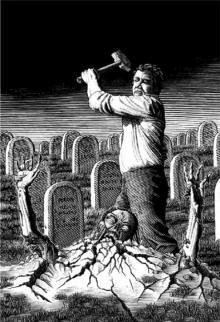 Dawn of the Dreadfuls
Dawn of the Dreadfuls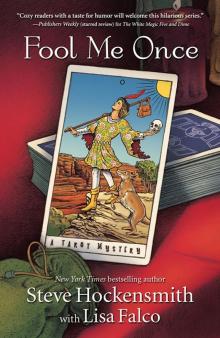 Fool Me Once: A Tarot Mystery
Fool Me Once: A Tarot Mystery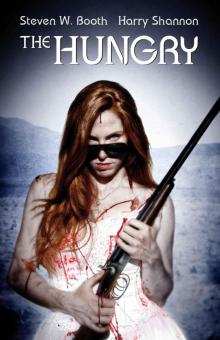 The Hungry
The Hungry Naughty: Nine Tales of Christmas Crime
Naughty: Nine Tales of Christmas Crime Pride and Prejudice and Zombies: Dawn of the Dreadfuls papaz-1
Pride and Prejudice and Zombies: Dawn of the Dreadfuls papaz-1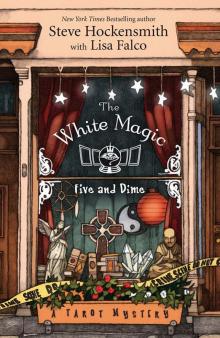 The White Magic Five & Dime (A Tarot Mystery)
The White Magic Five & Dime (A Tarot Mystery)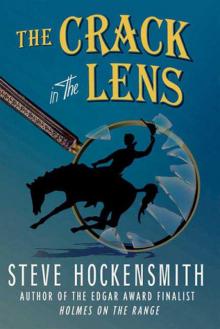 The Crack in the Lens
The Crack in the Lens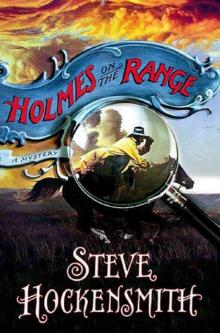 Holmes on the Range
Holmes on the Range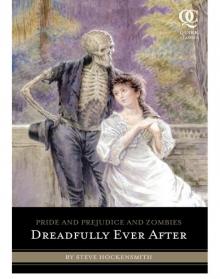 Dreadfully Ever After
Dreadfully Ever After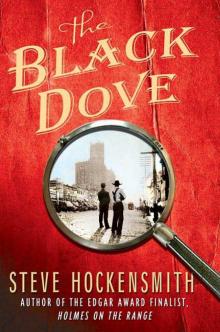 S Hockensmith - H03 - The Black Dove
S Hockensmith - H03 - The Black Dove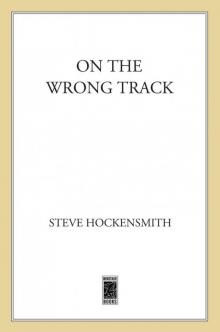 On the Wrong Track
On the Wrong Track Naughty-Nine Tales of Christmas
Naughty-Nine Tales of Christmas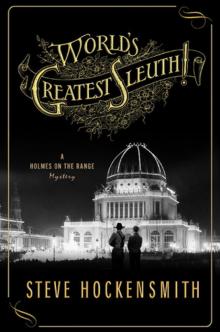 World's Greatest Sleuth!
World's Greatest Sleuth!